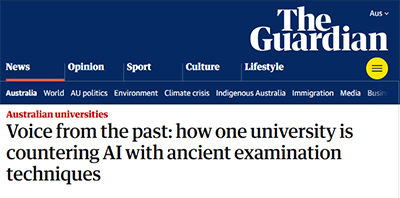Say what? Verbal assessments replacing exams in some subjects
By Annabel Mansfield
 RESEARCH Oral exams have been shown to cut stress, boost grades and protect academic integrity.
RESEARCH Oral exams have been shown to cut stress, boost grades and protect academic integrity.They may be more akin to learning a language, but conversation-based assessments are now making their way into a range of university science disciplines, and they’re proving a valuable alternative to the traditional exam.
In a push to provide a more authentic and personalised assessment experience, UniSA is providing oral assessments for students studying laboratory medicine and biomedical sciences, enabling them to showcase their subject understanding in a less formal setting.
As an authentic conversation between an assessor and a student, the Interactive Oral Assessment (IOA) has replaced final written invigilated exams in the Bachelor of Laboratory Medicine and Bachelor of Biomedical Science programs.
Lecturers say it has fostered deeper subject understanding while alleviating stress associated with written exams. And the results speak for themselves: students showed a 15% improvement in final assessment scores, a 20% increase in overall course performance, and a 40% increase in student satisfaction.
UniSA Biosciences lecturer Dr Sarah Davey says the one-on-one format of the IOA lets assessors gauge the depth of a student's knowledge in less confronting circumstances.
“Interactive Oral Assessments are proving a fantastic way for students to showcase their understandings without the stress of a traditional exam environment,” Dr Davey says.
“Many students feel anxious and stressed about exams which can sometimes impact their performance.
“Oral assessments help to break down these barriers. Not only do they facilitate student-tailored assessments, but they do so without adjusting the assessment rubric or the achievement milestones, so they’re highly effective and efficient.
“Additionally, because we can ask unseen follow up questions, we can really engage the student on what they’ve learnt and support them to perform at their best.”
The interactive, genuine nature of the oral assessment provides an opportunity for teaching staff to support students, especially those with English as a second language, neurodiversity or exam anxiety, says UniSA Biochemistry and Biomedical Sciences senior lecturer, Dr Chris Della Vedova.
“Even when students can choose a different assessment method, most end up opting for the IOA. And it’s a great option for many neurodiverse students, given the fluid, personalised nature of a conversation,” Dr Della Vedova says.
“Students respond well to the conversational format, and say that they feel more confident in their performance because the assessment feels more natural than an exam.
“It’s good for staff too, as the IOAs take significantly less time to mark; we incorporate plenty of training and practice opportunities for the final assessment throughout the course.”
In an age where generative AI can create essays and exam responses in a matter of seconds, the real-time interactive assessment format is protecting academic integrity.
“There’s nothing stopping students from using AI during the preparation process, but with current technology it would be very difficult to use it during the assessment,” Dr Della Vedova says.
“Since implementing the IOAs in 2022, we’ve not had a single academic integrity breach. It’s very clearly a step forward for navigating AI.”
Other Stories
- Social media likes and comments linked to young men’s obsession with perfect pecs and a six-pack
- Say what? Verbal assessments replacing exams in some subjects
- What’s the difference between gelato and ice cream? Is one healthier?
- GPS alternative for drone navigation using visual data from stars
- From the Vice Chancellor: Do or do not
- Achievements and Announcements
- Australia ranks in top three study locations for female international students
- Students race to the finish line at the ‘STEM Speedway’
- UniSA News In Pictures: Unstoppable Awards






